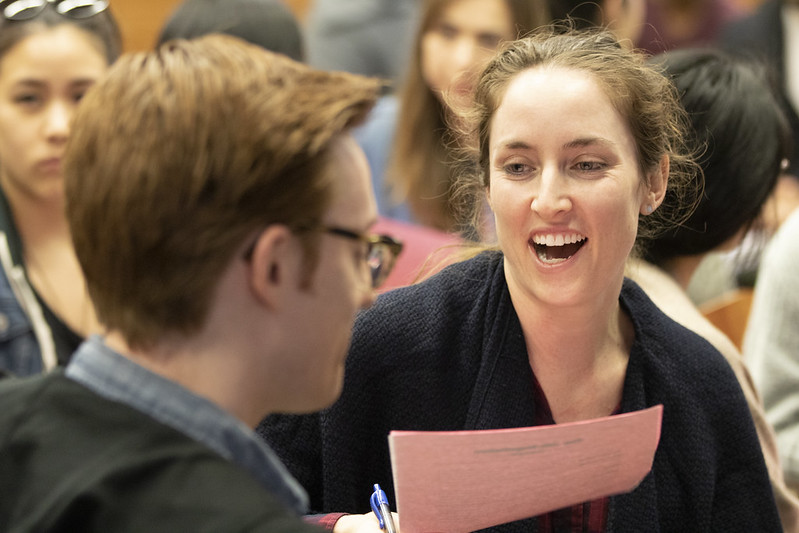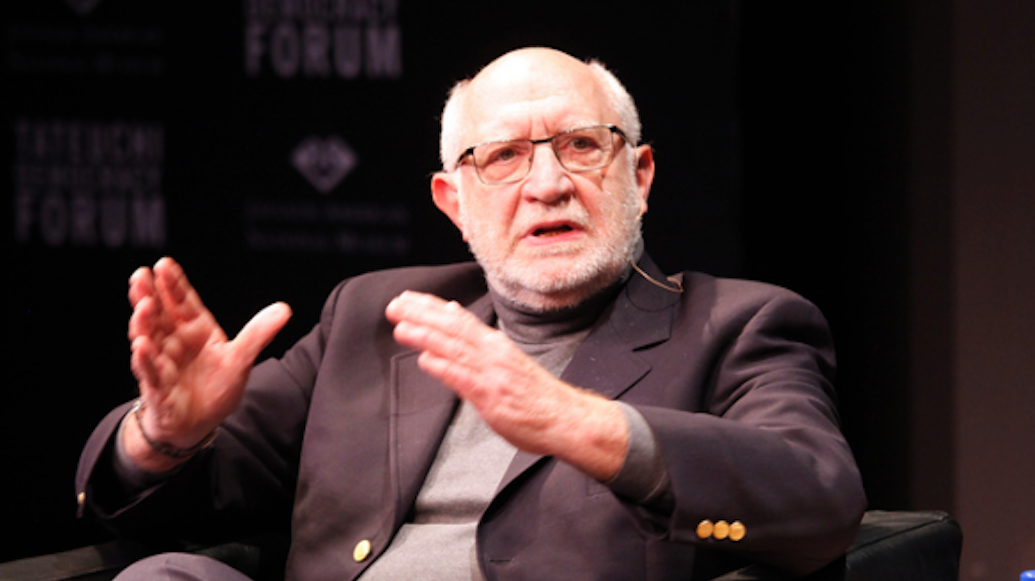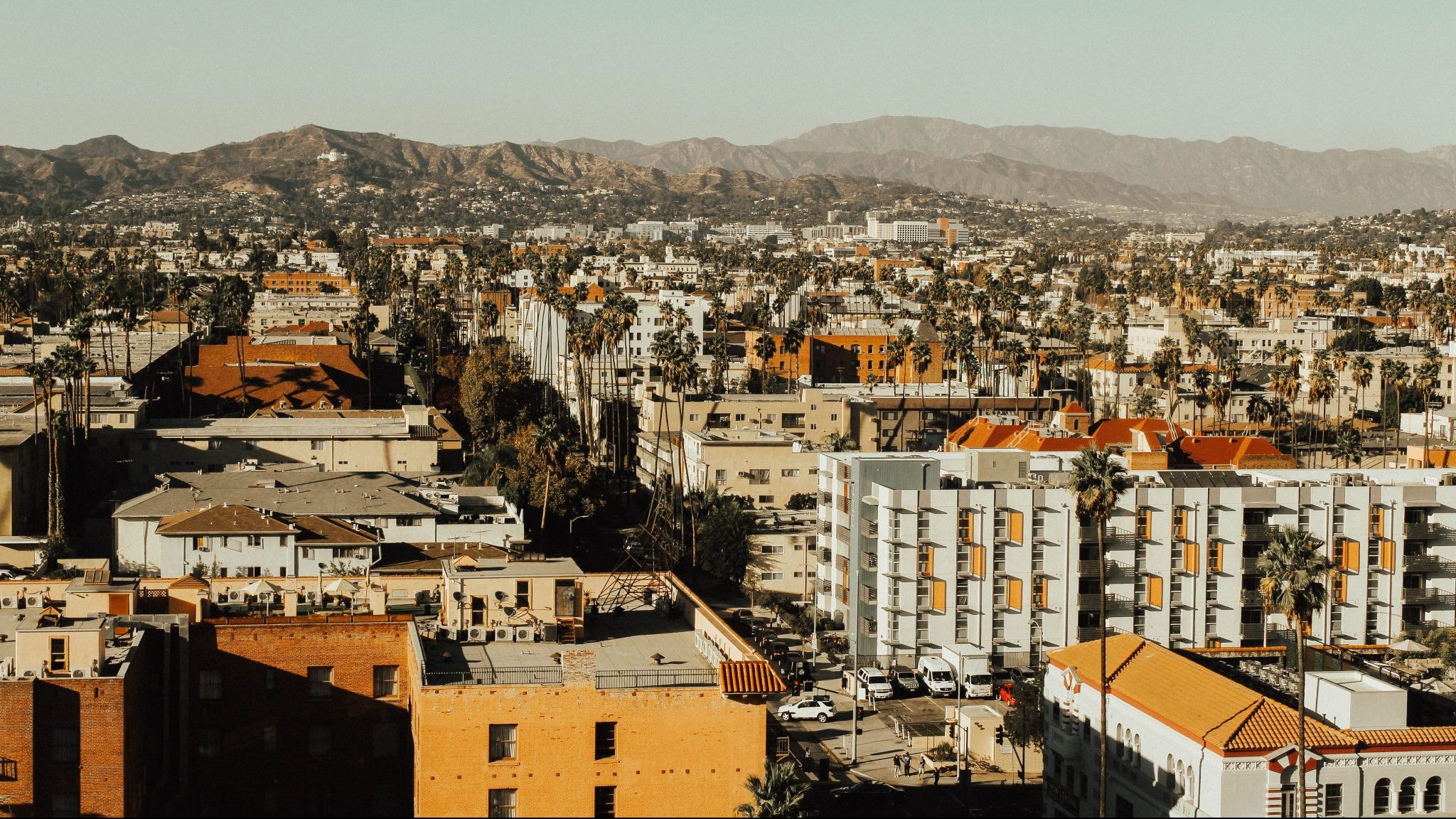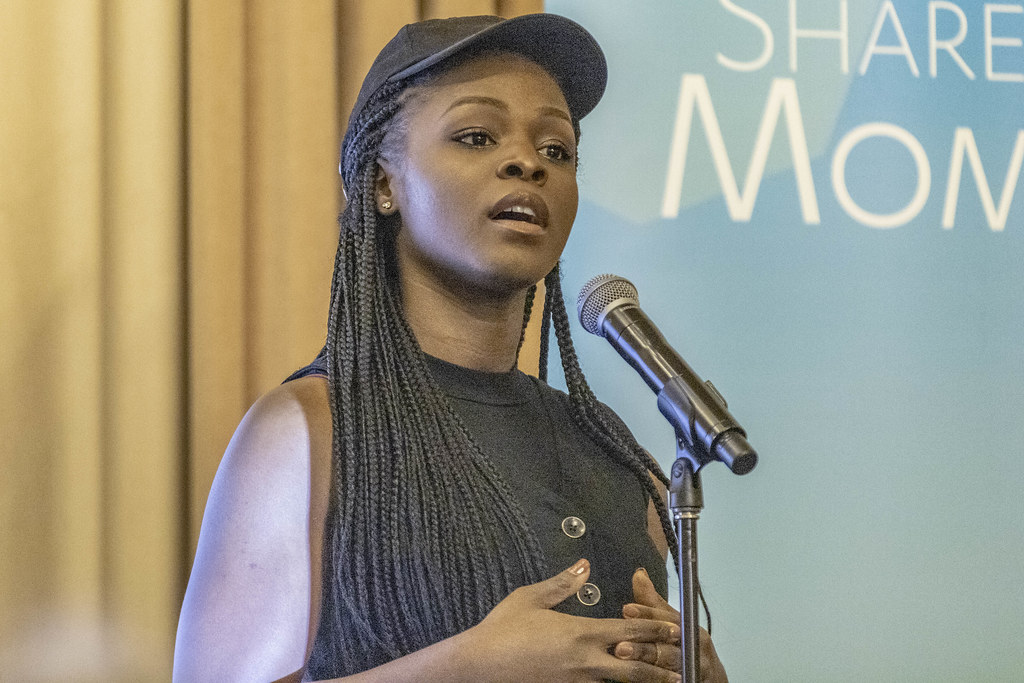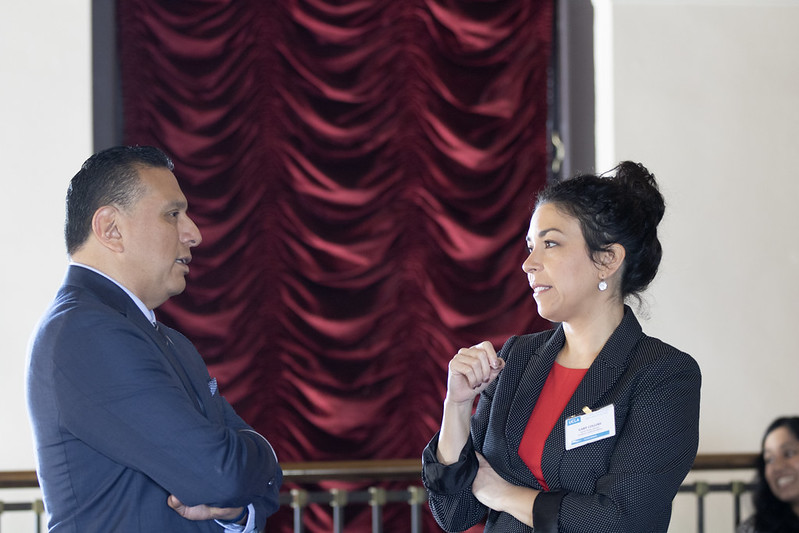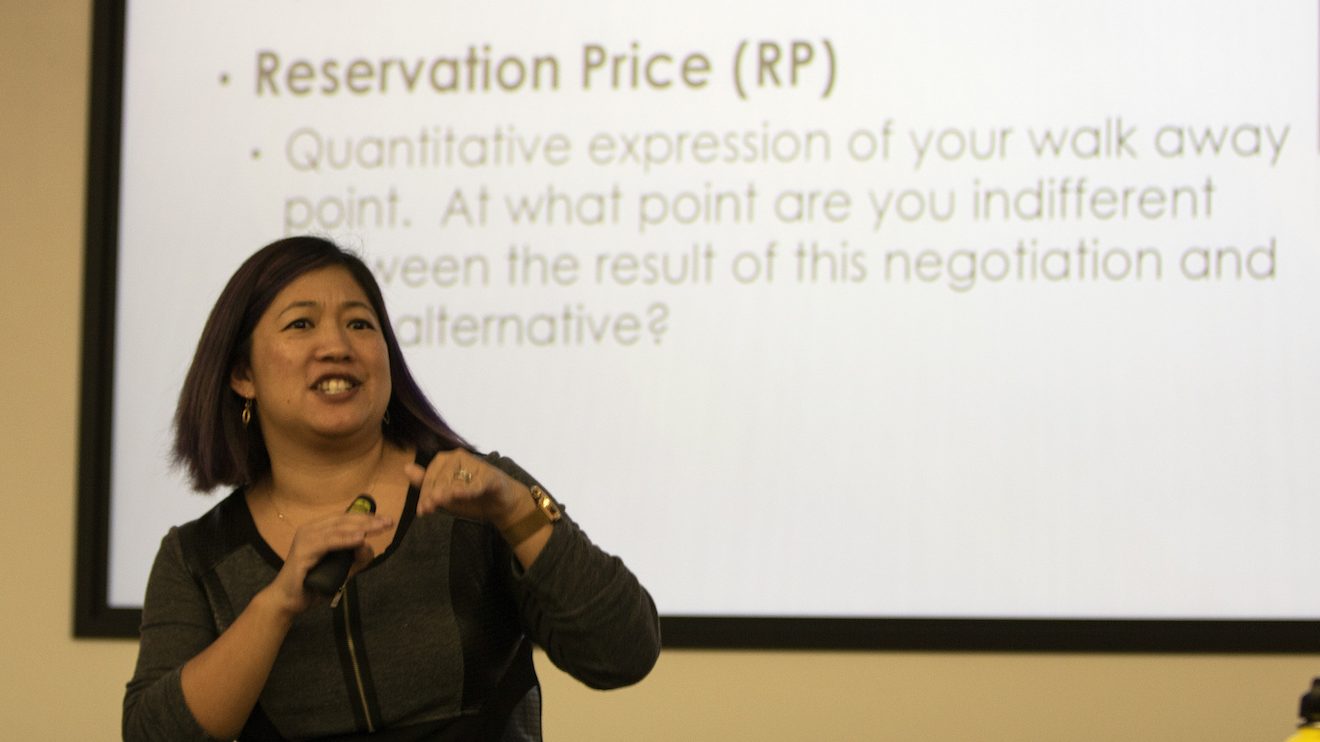
Workshop Teaches Real-World Skills in Job and Salary Negotiation
Public policy lecturer Kimberly Ling Murtaugh explained the ins and outs of job and salary negotiation at a workshop conducted in the Charles E. Young Research Library on March 7, 2019. The workshop was sponsored by Luskin Career Services, which promotes career readiness and prepares graduate students for employment. The workshop attracted students from all three UCLA Luskin graduate programs, including many second-year students preparing to enter the workforce after they graduate in the spring. Ling Murtaugh explained the essentials of negotiation analysis in three steps. First, job candidates can determine how much power they have in a negotiation by identifying their best alternatives to a negotiated agreement (BATNA) — a strong grasp of their options if the negotiation fails. Next, job candidates should identify their “reservation price,” the point at which they walk away. The last step is identifying a target, which Ling Murtaugh defined as a “realistically optimistic deal that will take care of your wants.” She recommended making a checklist of needs and wants to decide what kind of a salary is acceptable. “Negotiations are just another problem to be solved,” she said. “Tackle [negotiation] the same way you would another problem in the classroom.” While salary negotiation can be daunting, Ling Murtaugh explained that coming out of school is one of the best times to negotiate a jump in salary. She recommended preparing for negotiation by practicing with family members, friends or classmates. “Know your worth,” Ling Murtaugh told the graduate students. “Candidates have sources of power that they often forget.” — Zoe Day
View photos from the workshop on Flickr.

UCLA Sponsors Symposium on Universal Health Care
UCLA hosted experts in health care and policy at the E. Richard Brown Symposium on universal health care in California. Faculty with joint appointments at UCLA Luskin contributed to the symposium through workshops and presentations. The March 1-2, 2019, event honored the legacy of E. Richard Brown, a UCLA professor and public health leader who advocated for health care reform. The UCLA Center for Health Policy Research, founded by Brown in 1994, celebrated its 25th anniversary with the symposium. The first day of the conference, which can be accessed via webcast, took place in Sacramento and focused on planning, policy and political perspectives. UCLA professor of health policy and management Gerald Kominski gave a presentation on the contributions to coverage policies made by the Center for Health Policy Research. UCLA hosted the second day of the conference, including a workshop on the successful implementation of universal health care systems in Taiwan, Canada and other middle-income countries. UCLA professor of health policy and management Thomas Rice spoke about realizing Brown’s wish for universal health care. The symposium also featured UCLA professor of public policy Mark Peterson and professor of health policy and management and public policy Jack Needleman. Joseph Kutzin of the World Health Organization summarized the importance of universal health care: “Everyone should be able to have access to good-quality health services, without fear of the financial consequences for themselves, their families, their businesses and their jobs.”
Reality Check for Newsom’s Housing Crisis Plan
A new UCLA report casts doubt on the feasibility of Gov. Gavin Newsom’s campaign promise to address California’s housing affordability crisis by building 3.5 million new homes by 2025. The policy brief from the UCLA Lewis Center for Regional Policy Studies shows that cities and counties have the capacity to construct just 2.8 million new housing units. The report adds that “historically, only a fraction of planned units are actually built” due to limited demand, community opposition and other factors. The report also found that “much of the planned capacity is located in the relatively lower-demand, more rural parts of the state. … High-demand communities do not plan for or permit housing, and planned capacity in low-demand areas remains unbuilt.” The brief, titled “Not Nearly Enough: California Lacks Capacity to Meet Lofty Housing Goals,” is based on research conducted by Paavo Monkkonen, associate professor of urban planning at the UCLA Luskin School of Public Affairs, and Spike Friedman, an urban planning master’s student. Monkkonen is senior fellow for housing policy at the Lewis Center. The researchers examined data from 525 municipalities and unincorporated areas, which are mandated to zone for sufficient new housing construction to accommodate population growth. The brief highlights the obstacles created by the state’s zoning policies and the difficulty Newsom will face in meeting his stated goal. With California’s current construction patterns averaging 80,000 new housing units per year, the governor’s plan would require a sevenfold increase in housing construction. — Zoe Day
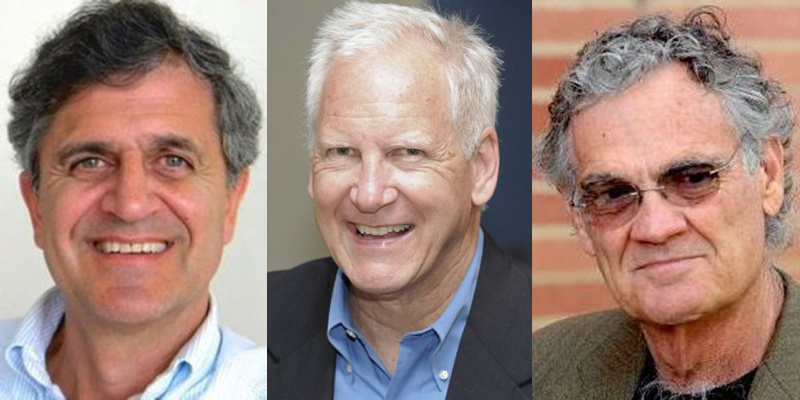
UCLA Luskin Faculty Among Top 100 Social Work Scholars
UCLA Luskin Professor David Cohen and Professors Emeritus Yeheskel “Zeke” Hasenfeld and Robert Schilling were recognized in the Journal of Social Service Research’s list of the “100 Most Influential Contemporary Social Work Faculty as Assessed by the H-Index.” The report uses a new method called the H-Index to measure the impact and influence of social work scholarship, taking into account not only the number of publications an individual has authored, but also the number of times that his or her work has been cited by others. “It feels great to be included in a list of highly cited scholars in my field — especially when some were my teachers,” said Cohen, who is also associate dean for research and faculty development at UCLA Luskin. “But creativity and quality mean more than citations — so I plan to keep on trucking, hoping that my best work is still ahead of me.” Cohen, whose research focuses on the effects of psychoactive drugs, treatment-induced harms and mental health trends, has authored and co-authored more than 100 book chapters and articles. Distinguished Research Professor Emeritus Hasenfeld, who passed away Feb. 28, 2019, was cited for his insightful investigation of the relationship between social welfare policies, the organizations that implement them and the people who use their services. Schilling’s research focuses on developmental disabilities, HIV risk and prevention, and substance abuse. Also on the list is Ron Avi Astor, who will join the UCLA Luskin faculty in the 2019-2020 school year. Astor is an internationally recognized expert on school safety. — Zoe Day
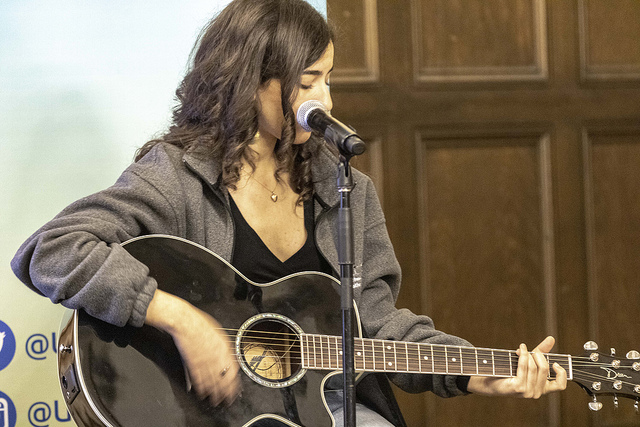
Students Join Black Lives Activist to ‘Flip the Script’
On Thursday, Feb. 21, the UCLA Luskin Undergraduate Program presented “Flip The Script: Stories of Social Change,” featuring guest speaker Funmilola Fagbamila, founding member of the Black Lives Matter movement, and five student presenters who showcased their work. The event began with one simple question: “What does social change mean to you?” Each presentation sought to answer that question in a uniquely personal way. Student Mei Blundell performed a piece called “The Escape of Lin Cong” on the yangqin, or Chinese hammered dulcimer, featuring a haunting and complicated melody. Next, Carolyn Travis performed an original poem called “Mujeres” —spoken alternatingly in Spanish and English — about violence toward women and how so much of it often goes undocumented and unreported. Hua Chai presented an animated short discussing technology and conditioning in an abstract manner. Sahfa Aboudkhil performed an original song “For Emilie” on acoustic guitar about women speaking up in light of sexual violence. Alejandro Xipecoatl Juarez performed a dynamic spoken word poem, “Let Me Free,” about Chicano identity in our society. Kate McInerny, a freshman pre-major in public affairs, was emcee of the free event at the Kerckhoff Grand Salon. The evening ended with a talk and Q&A by Fagbamila, who was an inaugural Activist-in-Residence at UCLA Luskin’s Institute on Inequality and Democracy. She spoke about her experience in the social and political arenas and shared her views on modern activism as told through an allegorical story about three archetypal black activists. — Jackson Belway
View photos from Flip the Script on Flickr:
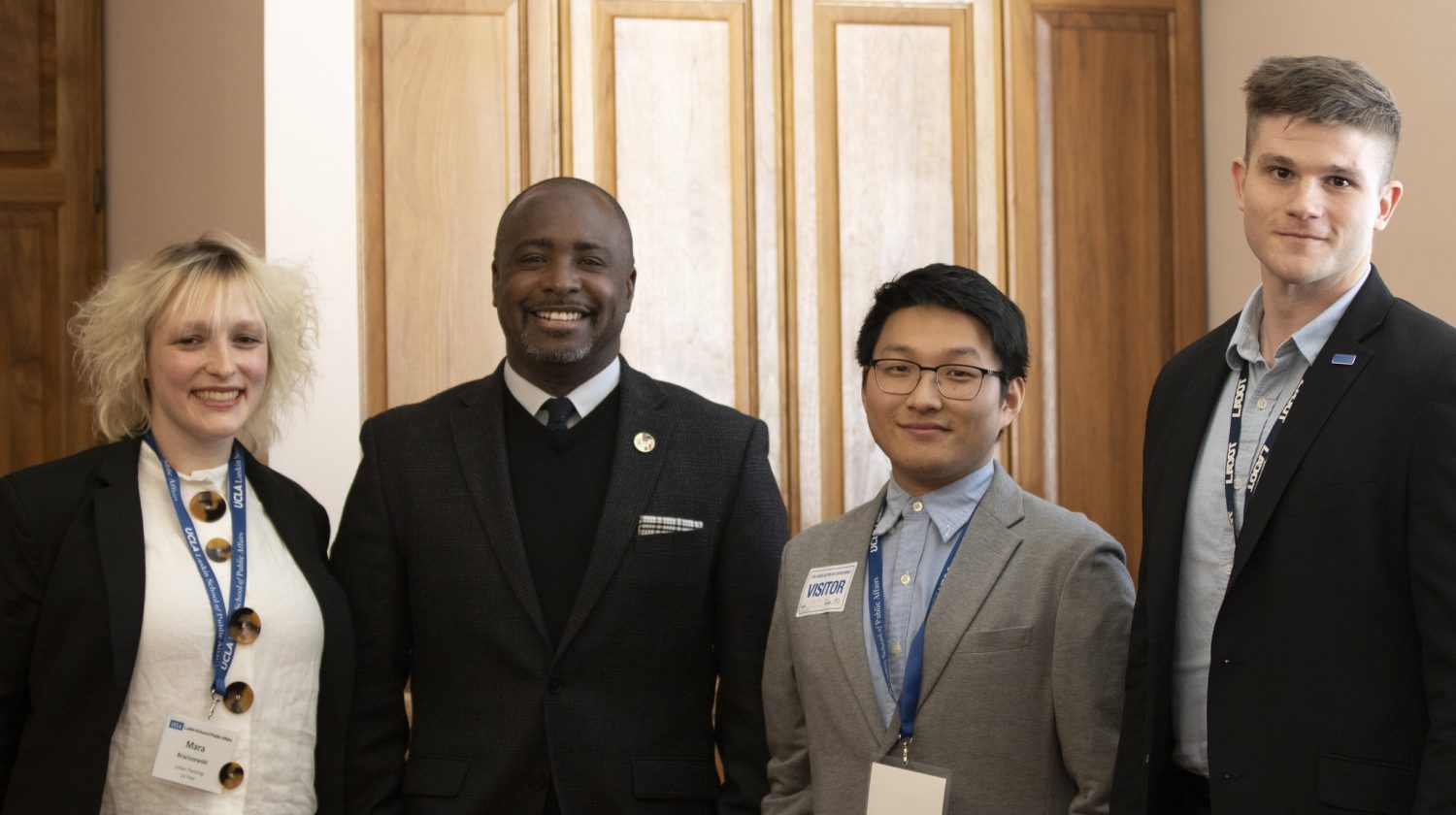
Students Tackle Climate Change in Visit to L.A. City Hall
Climate change — and what Los Angeles leaders and planners can do about it — was the topic of this year’s UCLA Luskin Day at City Hall held Feb. 15, 2019. Now in its 15th year, the event sees UCLA Luskin Urban Planning, Social Welfare and Public Policy students traveling to the iconic City Hall to discuss and debate a current policy issue with policymakers, officials from government agencies and community leaders. This year’s topic, “How Can Planning Combat Climate Change?” came from Councilmember Paul Koretz of District 5. Colleen Callahan MA UP ’10, deputy director of the UCLA Luskin Center for Innovation (LCI), served as program adviser for group of 18 students. Koretz wanted “outside-the-box ideas for addressing climate change through planning and policy solutions,” Callahan said, “and how to leverage what the city is already doing and build on new opportunities.” First-year MPP student Noreen Ahmed said, “I thought it was really valuable because the people we interviewed went straight into talking about what the issues were, what they cared about, how climate change is involved in what they are doing.” Ahmed also had the opportunity to interview Los Angeles city planners. Koretz will receive a written memorandum of findings and policy recommendations from the students, according to organizer VC Powe, executive director of external programs and career services. “What happens here in Los Angeles doesn’t stay in Los Angeles,” Koretz told the visiting group. “We are one of the most watched cities in the world. We take action and it spreads statewide — sometimes nationally, sometimes globally. We hope that what we do here in Los Angeles can literally help save the world in terms of dealing with climate change.” The annual trip is co-sponsored by UCLA’s Office of Government and Community Relations. —Stan Paul
View photos from the day on Flickr.
